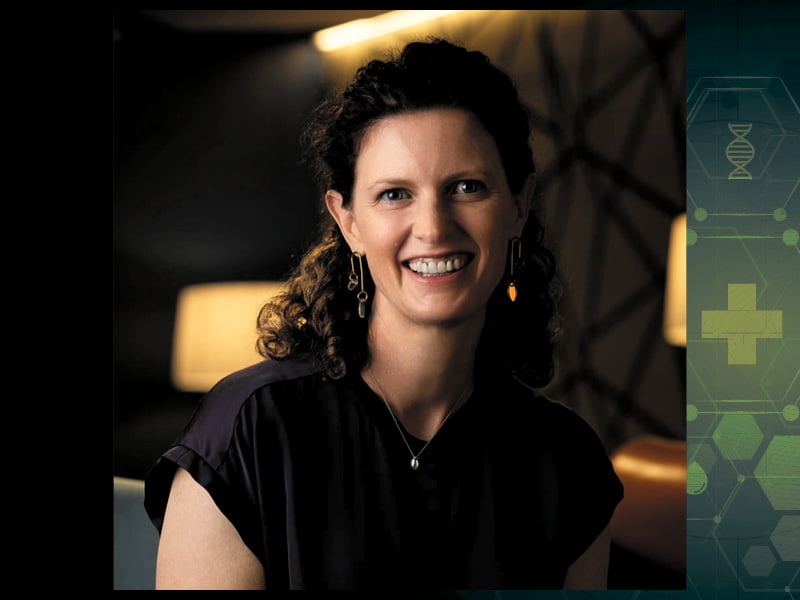With a mission to connect government, consumers, academia and researchers to deliver a cooperative approach to digital health innovation, the Digital Health CRC is at the forefront of the most pressing healthcare challenges facing society today.
However, there is one fundamental challenge that is often overlooked in the push to innovate and commercialise new technologies; that is the need to train and upskill the current and future workforce who will be critical to the success of this new way of delivering patient care.
In terms of the digital health evolution, this challenge is critical for the Digital Health CRC (DHCRC) which plays an important advocacy role in digital health — particularly in educational upskilling.
“Because technology is moving so quickly, we need to be able to upskill people in parallel (with traditional skills), and find effective new ways of doing that,” said DHCRC education manager Dr Melanie Haines.
“One way to look at it is as a spectrum where your learning happens progressively throughout your career. It traditionally starts with formal education at university, but given the speed of change and rapid take-up of technology, you’re not just going to learn once; you’re continuing to learn across your entire career.”

In this context, digital upskilling will fall on the health sector, employers, and employees themselves to adopt a mindset of lifelong learning, in order to fully embrace the opportunities presented in digital health.
“Digital upskilling means enabling or empowering the development of a mindset where technology augments (traditional) practices. It’s not just a digital replacement of a previously manual task, but a broadening of these capabilities,” said the DHCRC research director Dr Clare Morgan.
“To this end, the DHCRC is supporting research into how clinicians can adopt the behavioural change that’s required to embrace technology and how clinicians change when they’re challenged by data.
“It’s not a sensible approach to invest in implementing new technologies if the people on the ground don’t have the skills to realise the full potential of these applications.”
Sustainable learning that moves with the times
A key pillar of the program of activity at DHCRC is to invest in upskilling and educating the next generation of healthcare professionals.
The DHCRC oversees the delivery of a range of graduate and internship training programs which include two recently established initiatives: a clinical fellowship with the Australasian Institute of Digital Health (AIDH) and a micro-credentials program at RMIT University.
The fellowship offered by the DHCRC is a global first, said Dr Haines — and the lack of established career pathways in digital health was the catalyst for the program.
“The DHCRC fills an important gap by providing a clinical fellowship that allows for a nationally recognised digital program in clinical health,” she said.
“For clinicians that want to be a recognised expert in digital health, we’ve established a fellowship program where you can effectively work towards that vocation.”
Essentially, this digital overlay improves their specialty areas.
“In the past, people had to choose between whether they were going to specialise in their area or specialise in digital health,” Dr Haines said.
“Recognition for both sides of the equation is proving paramount to the long-term results of augmenting the digital health learning to their specialty areas.”
Micro method offers a world of change
Another innovative educational facet being offered by DHCRC is a micro-learning pilot (the style of which is based upon research conducted by the Harvard Business Review).
Enabled via DigiTech, the pilot is accessible on mobile devices to encompass bite-sized (five minutes) learning on a daily basis. This suits not only the continual uptake of absorbing new information, but also fits into the often-frenetic lifestyle of clinicians.
“The learning integrates within their work and lifestyles,” Dr Haines said.
“If you ask clinicians if they want to upskill, they do, but they’ve got no time. This pilot provides a convenient and easily accessible technique of learning retention.
“They can also apply it practically in the flow of their work, which tends to build retention of that knowledge via (the pilot’s) application.”
People’s bandwidth and their ability to keep up with the evolution of digital health technology is a constant focus in the implementation of sustainable change for digital upskilling.
“We only have to reflect on how far technology has come in the last couple of years during the pandemic to know how fast it is moving,” Dr Morgan said, citing the prevalence of online meetings versus face-to-face encounters.
This increasingly applies to interactions between patients and GPs — offering many healthcare solutions — not least of which are the travel restrictions imposed by lockdowns or chronic illnesses.
“Telehealth removes that barrier and enables them to get better access to healthcare,” Dr Morgan said.
This story is part of DHCRC’s category award sponsorship of the InnovationAus 2022 Awards for Excellence.
Do you know more? Contact James Riley via Email.
